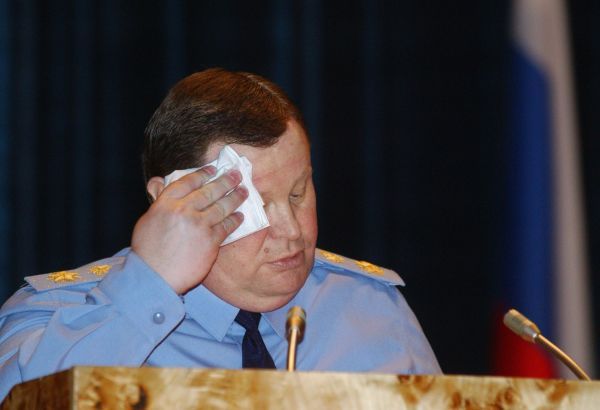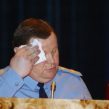
Moscow Continues Campaign to Suppress Circassian National Aspirations
Publication: Eurasia Daily Monitor Volume: 7 Issue: 2
By:

On December 22, Russian President Dmitry Medvedev’s representative in southern Russia, Vladimir Ustinov, gave his annual speech on growing security threats in the North Caucasus, addressed to the Federation Council in Moscow. In listing the most dangerous threats to the security of the Russian Federation, such as the growth of the “bandit underground resistance,” Ustinov also referred to “Circassian nationalists” who, he said, are demanding the creation of “a new federation subject by unifying Adygs, Cherkess, Kabardins, Abazas, Shapsughs” –the tribes that belong to the Circassian ethnic group, currently the most significant mono-ethnic group (approximately one million people) living in five separate subjects of Southern Russia, including the Sochi region (Rossiyskaya Gazeta, December 22).
The mere mention of the Circassian issue in an annual speech on Russia’s security in the North Caucasus given by a member of the Kremlin administration is simply unprecedented, since the defeat and deportation of the Circassians in nineteenth century. The Kremlin’s reaction was preceded by a whole chain of Circassian political activities both in the Diasporas and in homeland. Since 2007, Circassian NGO’s have consistently announced their goal to reunify their homeland on the territories of Adygeya, Karachaevo-Cherkessia and Kabardino-Balkaria (JF, NCA November 26, 2008).
At a meeting in Maikop, Adygeya, three Circassian NGO’s drafted a letter to President Medvedev, accusing Ustinov of “malicious slander and outright provocation” in attempting to link the Circassian public organizations and their leaders “with a terrorist underground band in the North Caucasus.” The letter stated that the Circassian NGO’s have never broken any laws or regulations of the Russian Federation and have not crossed legal boundaries in their actions (Natpress, December 26).
A number of physical attacks against Circassian NGO activists were reported to have taken place, often soon after or just before the organized or planned public protest actions (EDM, November 18, 25, December 3, 17).
However, some of the abuses that remained unknown to the general public were discussed in internet chats and forums such as www.heku.ru and www.elot.ru. Detailed testimony of the prosecutions against Tolustan Kertov, the leader of the NGO “Khabzem i Nur” (The Light of Khabze), was recently published on the Natpress website based in Maikop, Adygeya (https://www.natpress.net/stat.php?id=4745). The testimony gives an account of threats that began on the Circassian Memorial Day May 21, 2009, when “Khabzem i Nur” organized a minute of silent protest on Moscow’s Teatralnaya Square. Members of the NGO were arrested and taken to a police station on charges of holding an unauthorized demonstration and released only after five hours of interrogation. According to Natpress, Tolustan Kertov received a direct threat after releasing letters of support in favor of the Circassian activists. Men with a Slavic appearance met Kertov in front of his house and invited him to join them in their car. They gave him a piece of paper that read: “1,000,000 –you, or 1,000– solving your problem.” Kertov believes that the numbers on the paper were prices: the first, the price for him to become a well-paid agent; the second, the price of his life. Kertov said he does not know what to expect next, but that the NGO “Khabzem i Nur” will continue on its chosen path (Natpress, December 26).
There is a strong possibility that the testimony described above is the first publicly reported attempt to recruit a leader of a Circassian NGO, although there is the belief among the Circassians that most of the Circassia national NGO’s in Russia and even some in the Diasporas have been infiltrated by agents of Russia’s Federal Security Service (FSB). As a consequence, the agendas of those NGO’s obviously differ from the ideas of national unification and independence (NCA, February 14, 2007).
In light of infiltration by the Russian secret services, it is significant that during the last month of 2009 all of the officially recognized and licensed Circassian NGO’s in the North Caucasus came out with public announcements of “their ideas of the involvement of the Circassian component in the Sochi Olympics.”
According to the Regnum news agency, a meeting of the Circassian NGO’s took place in Maikop, Adygeya on December 21, during which the participants discussed a letter to the Russian president from Kanshowbi Ajakhov, the newly-elected president of the Worldwide Circassian Association (Duneypso Adiga Khasa), with a proposal on Circassian participation in the Sochi Winter Olympic Games in 2014. The proposal involves wide scale celebration of the games in Circassian communities, cities and villages, and in Sochi, during the Olympics.
The Regnum report described the discussion as a very enthusiastic process, during which Circassian activists approved Ajakhov’s letter and even went further, with the idea of popularizing the Sochi Olympics among the younger generation and school-age children (Regnum, December 23).
The only opposition to the WCA’s project came from a single man, Askerbi Milinov, known for having gone to the streets of Maikop in 2008 to protest against the celebration of the 450 years of the so-called Russo-Circassian voluntary union. Milinov, who came to the parade holding a hand-made sign: “Why have you destroyed and deported my beautiful noble people?” was arrested by the local anti-terrorism police and interrogated for more than eight hours.
During a meeting in Maikop, Milinov said that every single Circassian in the world must oppose the Sochi Olympic Games, and his words received applause. However, Milinov was immediately removed from the scene.
While Milinov was the only Circassian to speak out on an official meeting, his position is widely shared by millions of Circassians around the world, as well as by the younger generation of Circassians in the North Caucasus. The Circassian Congress NGO, which has branches in the Circassian republics of the KBR, KChR, Adygeya, as well as in Circassian communities in Jordan, the United States, Turkey and Israel, strongly opposes the Sochi Olympic Games with the slogan: Sochi –the land of the Circassian genocide (NCA, August 16, 2007). Mass protest demonstrations frequently take place in the Circassian Diasporas in the United States, Turkey, Israel and Europe (www.kavkaz-uzel.ru, October 7, 2007; www.circassianworld.com, May 21, 2009).
Although Ustinov’s speech can easily be interpreted as a warning to the Circassians, the major and real reason for the Kremlin to label Circassians as a security threat might be their strong opposition to Prime Minister Vladimir Putin’s personal project – the 2014 Olympic Games in Sochi, the place that Circassians value as a national monument to a mass atrocity and genocide.
The fact that the Circassian NGO’s recognized by Russia came out with their “Project of Circassian participation in the Sochi Olympics” at a perfectly chosen time –after a series of attacks on leaders of Circassian NGO’s not approved by Moscow, and a clear warning from the Kremlin’s representative (with media support) – does not seem to be a coincidence, but rather a well-organized campaign against Circassian nationalism. Once again, among the array of policy choices, the Kremlin has chosen the same violent KGB-style methods of marginalizing opposition national movements, which in the case of the North Caucasus obviously leads to radicalization.




